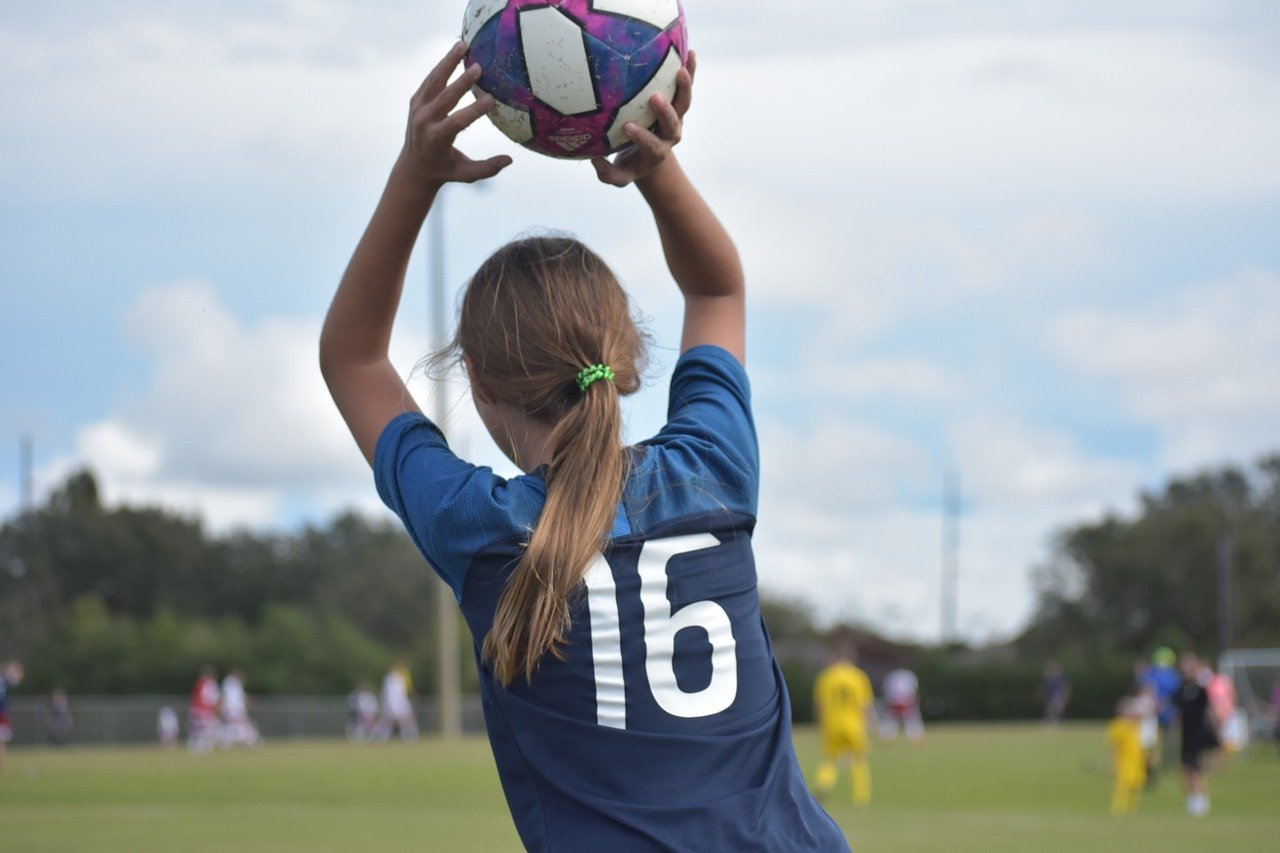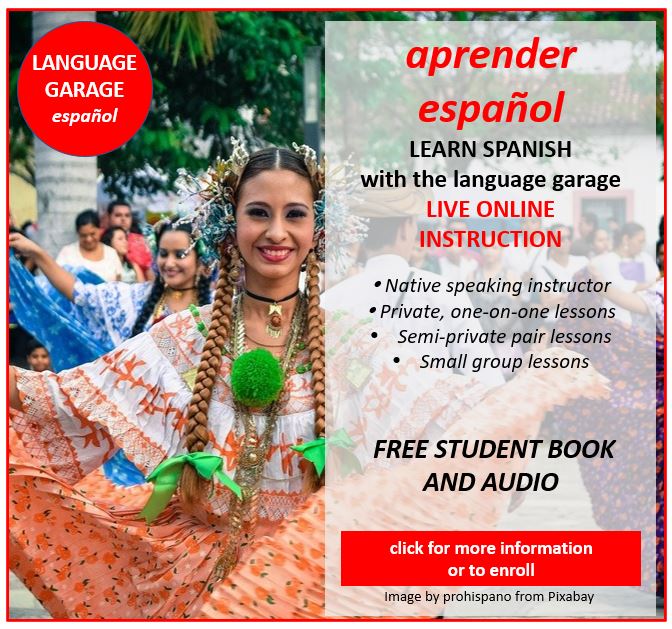Image Source: mwarren1999 on Pixabay
In this post we’ll look at lots of action verbs that will come in handy when you’re talking everyday life.
¿A dónde vas? Where are you going?
Let’s start with a bunch of verbs to talking about coming and going: ir (a pie, en carro/coche) to go (on foot, by car); caminar to walk; venir to come, salir de/irse to leave; llegar to arrive; salir to go out; entrar to enter.
- Voy al trabajo en carro. Voy al trabajo a pie.
I go to work by car. I go to work on foot. - Caminamos por el parque todos los domingos.
We walk in the park every Sunday. - ¿Quién viene a la fiesta este fin de semana?
Who’s coming to the party this weekend?
- Normalmente salgo tarde del trabajo.
I usually leave work late. - El tren llega a las 10 de la mañana.
The train arrives at 10am. - Salgo con amigos.
I go out with my friends. - Nunca voy al parque en la noche.
I never go in the park at night.
¿A qué hora te levantas? What time do you wake up?
Now let’s see some verbs that you can use to talk about your daily routine: levantarse/ despertarse to wake up; ducharse to take a shower; bañarse/ tomar un baño to take a bath; vestirse to get dressed; ponerse una camisa to put on a shirt; desvestirse to get undressed; quitarse los pantalones to take off pants; cepillarse los dientes to brush your teeth; lavarse las manos to wash your hands; desayunar/ almorzar/ cenar to have breakfast/ lunch/ dinner; acostarse/irse a dormir to go to bed; dormir to sleep.
- Durante la semana me levanto temprano, los fines de semana me levanta tarde.
I wake up early during the week, and l wake up late on the weekend. - Siempre me ducho en la mañana. Nunca tomo un baño.
I always take a shower in the morning. I never take a bath. - Me visto rápido.
I get dressed quickly. - Ella se pone un suéter cuando hace frío.
She puts on a sweater when it’s cold. - Me desvisto antes de acostarme.
I get undressed before bed. - Él se quita los zapatos en la casa.
He takes off his shoes in the house. - Me cepillo los dientes después de comer.
I brush my teeth after I eat. - Me lavo las manos antes de comer.
I wash my hands before I eat. - ¿A qué hora te acuestas / se acuesta normalmente?
What time do you usually go to bed? - ¿Cuántas horas sueles / suele dormir?
How many hours do you usually sleep?
Habla mucho. He talks a lot.
Here are several general verbs that you can use in daily life. hablar to speak, to talk; decir to say; entender to understand; aprender to learn; estudiar to study; dar to give; hacer to make; tomar to take; preguntar to ask (a question); pedir to ask (for something); responder to answer; abrir to open; cerrar to close; usar to use; recoger to pick up; poner to put.
- ¿Cuántos idiomas hablas / habla?
How many languages do you speak? - Todos los días hablo con mis amigos.
I talk with my friends every day. - ¿Qué dice ella? No entiendo.
What is she saying? I don’t understand. - Los niños aprenden mucho en la escuela.
Children learn a lot in school. - ¿Qué estudias en la universidad?
What do you study at university? - Le doy un regalo a mi amigo/amiga por su cumpleaños.
I give my friend a present on her birthday. - Los niños hacen regalos para sus padres.
The children make gifts for their parents. - ¿En la mañana tomas el tren o el bus?
Do you take the train or the bus in the morning? - Los niños preguntan mucho./Los niños hacen muchas preguntas.
Children ask a lot of questions. - El profesor/La profesora responde las preguntas.
The teacher answers questions. - Abre la puerta.
She opens the door. - Cierra la puerta.
He closes the door. - ¿Usas / Usa un bolígrafo o un lápiz?
Do you use a pen or a pencil? - Recojo mis bolsas.
I pick up my bags. - Normalmente pongo mis llaves en la gaveta.
I usually put my keys in a drawer.
¿Qué estás comiendo? What are you eating?
Now let’s look at some verbs that you can use to talk about typical situations at home: comer to eat; beber/ tomar to drink; cocinar/ preparar (comida) to cook; limpiar to clean; lavar los platos/ fregar los platos to do the dishes; lavar la ropa to do the laundry; guardar los platos to put away the dishes; ver TV/ mirar TV to watch TV; escuchar música to listen to music; leer to read; relajarse to relax; recostarse/ tumbarse to lie down; sentarse to sit down; levantarse/ pararse to stand up.
- Como mucho arroz.
I eat a lot of rice. - ¿En la mañana bebes / bebe té o café?
Do you drink tea or coffee in the morning? - ¡Cocinas / Cocina muy bien!
You cook very well! - Los sábados limpio mi apartamento.
I clean my apartment on Saturdays. - Todos los días lavamos los platos.
We do dishes every evening. - Él lava la ropa los domingos.
He does laundry on Sundays. - Guardamos los platos cuando están limpios.
We put the dishes away when they are clean. - ¿Ves la tele todos los domingos?
Do you watch TV every evening? - Escucho música todos los días.
I listen to music every day. - Todas las noches leo en la cama.
I read every night in bed. - Los fines de semana nos relajamos.
We relax every weekend. - En las tardes me recuesto.
I lie down in the afternoon. - Nos sentamos en la sala.
We sit down in the living room. - Él se levanta y se va de la habitación.
He stands up and leaves the room.
Estoy comprando comida. I’m buying food.
Here are some common verbs related to shopping: comprar to buy; ir de compras to go shopping; hacer la compra to go grocery shopping; buscar to look for; encontrar to find; pagar to pay; costar to cost; probarse to try on; gastar dinero to spend money; sacar dinero del cajero automático to withdraw money from an ATM; ahorrar dinero to save money.
- Compramos comida en el supermercado.
We buy food at the supermarket. - Todos los fines de semana vamos de compras.
We go shopping every weekend. - Estoy buscando un nuevo par de zapatos.
I’m looking for a new pair of shoes. - Él siempre encuentra algo interesante en esta tienda.
He always finds something interesting in this store. - ¿Pagas / Paga en efectivo o con tarjeta de crédito?
Do you pay by cash or credit card? - ¿Cuánto cuesta eso?
How much does that cost? - Siempre me pruebo la ropa antes de comprarla.
I always try on clothes before I buy them. - Ella gasta mucho dinero en libros.
She spends a lot of money on books. - Estoy sacando dinero del cajero automático.
I’m taking money out at the ATM. - Nunca ahorro dinero porque todo está muy caro.
I never save money because everything is so expensive.
¿Dónde trabajas? Where do you work?
Now let’s look at some common verbs you can use at work: trabajar to work; empezar/ comenzar to start; terminar to end; escribir to write; llamar por teléfono to call (on phone); enviar un correo electrónico to send an email; recibir un correo electrónico to get an email; tomar un descanso to take a break; tener una reunión to have a meeting; discutir to discuss.
- Trabajo los lunes, martes, miércoles, jueves y viernes. No trabajo ni sábados ni domingos.
I work on Mondays, Tuesdays, Wednesdays, Thursdays, and Fridays. I don’t work on Saturdays and Sundays. - Las reuniones comienzan todos los lunes a las 10 de la mañana.
The meetings starts every Monday at 10am. - ¿A qué hora termina la reunión?
What time does the meeting end? - Él escribe muchos informes.
He writes a lot of reports. - Llamo a mis clientes por teléfono.
I call my clients on the phone. - Ella envía muchos correos electrónicos / un montón de correos electrónicos.
She sends a lot of emails. - Ella recibe muchos correos electrónicos / un montón de correos electrónicos.
She receives a lot of emails. - En la tarde tomo un descanso y me tomo un café.
I take a break in the afternoon and drink some coffee. - Tenemos muchas reuniones / un montón de reuniones.
We have a lot of meetings. - ¿Qué discuten en las reuniones?
What do they discuss in the meetings?
Lo estamos pasando bien. We’re having a good time!
Now that we’ve gotten work out the way, let’s see some verbs that you can use for your free time: pasarlo bien/ disfrutar to have a good time/to enjoy yourself; bailar to dance; cantar to sing; sonreír to smile; reírse to laugh, ejercitarse/ hacer deporte to work out; nadar to swim; correr to run; jugar (al fútbol/ tenis/ baloncesto/ béisbol) to play (soccer/ tennis/ basketball/ baseball); tocar (un instrumento musical) to play (a musical instrument); saltar to jump; escalar/ trepar to climb; gatear /arrastrarse to crawl; andar en bicicleta to bike; ir en carro/ conducir/ manejar to drive; lanzar to throw; atrapar to catch.
- Siempre lo paso bien con mis amigos.
I always have a good time with my friends. - Todos los fines de semanas vamos a discotecas y bailamos.
We go to nightclubs and dance every weekend. - Canta muy bien.
She sings really well! - Siempre sonríe. Nunca está triste.
He always smiles. He’s never sad. - Ellos se ríen cuando están juntos.
They laugh when they’re together. - Me ejercito cuatro o cinco días a la semana.
Hago deporte cuatro o cinco días a la semana.
I work out four or five days a week. - ¿Nadas / Nada en una piscina o en un lago?
Do you swim in a pool or in a lake? - Los niños corren en el parque.
The children run in the playground. - Jugamos al béisbol/ baloncesto/ fútbol.
We play baseball/basketball/soccer. - Toco el piano/ la trompeta/ el violín.
I play piano/trumpet/violin. - Los chicos saltan en la cama.
The boys jump on the bed. - Las niñas trepan a los árboles
The girls climb trees. - El bebé gatea en el piso.
The baby crawls on the floor. - Todos los fines de semana andamos en bicicleta por el parque.
We bike every weekend in the park. - Todos los días voy al trabajo en carro.
Todos los días conduzco al trabajo.
I drive to work every day. - El chico lanza la pelota.
The boy throws the ball. - La niña atrapa la pelota.
The girl catches the ball.
Huelo algo. I smell something.
Here are a few verbs related to the senses: oler to smell; oír to hear; ver to see; probar/ saber to taste; tocar to touch; sentir to feel; parecer/ aparecer to seem/ appear; pensar/ creer to think; creer to believe; saber/ conocer to know; conocer a una persona to know a person.
- Olemos pan fresco.
We smell fresh bread. - Esta flor huele muy bien.
This flower smells really nice! - Mi hijo toca todo lo que ve.
The child touches everything he sees. - ¿Oyes / Oye a los pájaros?
Do you hear the birds? - ¿Ves / Ve a aquella mujer?
Do you see the woman over there? - Siempre pruebo la comida cuando cocino.
I always taste food while I cook. - Esta sopa sabe bien.
This soup tastes good. - ¿Cómo te sientes / se siente hoy?
How do you feel today? - Parece que está descontenta por algo.
She seems unhappy about something. - ¿En qué estás / está pensando?
What are you thinking about? - ¿Crees / Cree su explicación?
Do you believe his explanation? - ¿Qué es eso? No lo sé.
What is that? I don’t know. - Conozco a su hermana.
I know his sister.
No puedo oírte. I can’t hear you!
Now let’s look at a few modals and types of verbs that you can combine with other verbs: poder hacer can do; saber hacer know how to do; deber hacer/ tener que hacer must do/ have to do; querer hacer want to do; tener que hacer/ necesitar hacer need to do; empezar a hacer start doing; dejar de hacer stop doing; continuar/ seguir haciendo continue/ keep doing.
- ¿Puedes / Puede ver la televisión?
Can you see the television? - ¿Sabes / Sabe tocar guitarra?
Do you know how to play guitar? - Mañana tengo que trabajar.
I have to work tomorrow. - ¿Qué quieres / quiere hacer esta noche?
What do you want to do tonight? - Tengo que estudiar. Mañana tengo un examen.
I need to study. I have a test tomorrow. - Empezamos a trabajar temprano en la mañana.
We start working early in the morning. - Dejo de leer a la medianoche y me acuesto.
I stop reading at midnight and go to bed. - Siguen hablando durante la película.
They keep talking during the movie.
Learn Spanish with the Language Garage!
Interested in more Spanish? Check out our other posts on Spanish language, culture, and more. If you’re looking for convenient and affordable live Spanish lessons with a real teacher, visit The Language Garage. Our lessons are affordable and fun, and they’re given online in a virtual classroom, so it doesn’t matter where you live or work – we can come to you. We have flexible options, with a free trial so that you can decide if there’s a fit. Check us out!






